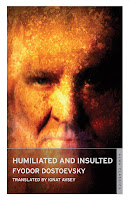 Staff review by Chris Saliba
Staff review by Chris SalibaDostoyevsky’s early novel Humiliated and Insulted is a brilliant achievement.
Humiliated and Insulted was Dostoyevsky’s second novel after his Siberian exile (he was charged with political subversion). Published in 1861, it was written with an eye on re-entry into the Russian literary world. Many of Dostoyevsky’s major literary works such as Notes from the Underground and Crime and Punishment would soon follow.
The plot is so wildly intricate and dramatic, no summary could do the novel justice. It’s perhaps best to say there’s an odious villain, Prince Valkovsky, a poor waif, Nelly, and two young women in love with the Prince’s son, Alyosha. One of the women, Katya, is a rich heiress. The other love interest, Natasha, is the daughter of middle-class parents and a childhood friend of the narrator, Vanya. The drama ostensibly centres around Alyosha and who he will choose for his wife. His father, the evil Prince, has been manoeuvring his son to marry the rich Katya, so he can get his grubby hands on her money. Another plot involves the waif Nelly and connects her to Prince Valkovsky.
It’s amazing to think that Humiliated and Insulted isn’t better known amongst English readers. The novel is a superbly baked souffle. Dostoyevsky reveals his story at a swift pace, astonishing the reader with a dizzying amount of detail. Every character’s smallest gesture and reaction is captured with absolute precision. While the style is almost naturalistic, there are also many uncanny effects. The descriptions of the wicked Prince are unforgettable, especially his Chinese slippers and bejewelled evening wear. Many scenes read as comic, similar in spirit to the black comedy of Elizabethan playwright Christopher Marlowe. Prince Valkovsky also has much in common with the wicked Robert Lovelace out of Samuel Richardson’s proto-feminist novel Clarissa (1748). He laughs as he commits his vices.
The only criticism that could be levelled at the book is the title. Humiliated and Insulted makes the novel sound like a dark, turgid tome, whereas its style is light and full of playful irony. Dostoyevsky fans should definitely pick this gem up. For new readers of Dostoyevsky, Humiliated and Insulted is a great place to start. Every page will thrill you.
Humiliated and Insulted, by Fyodor Dostoyevsky. Published by Alma Classics. ISBN: 9781847492692 RRP: $19.99
To sign up for our monthly newsletter, featuring new releases, book reviews and favourite articles from around the web, click here.

